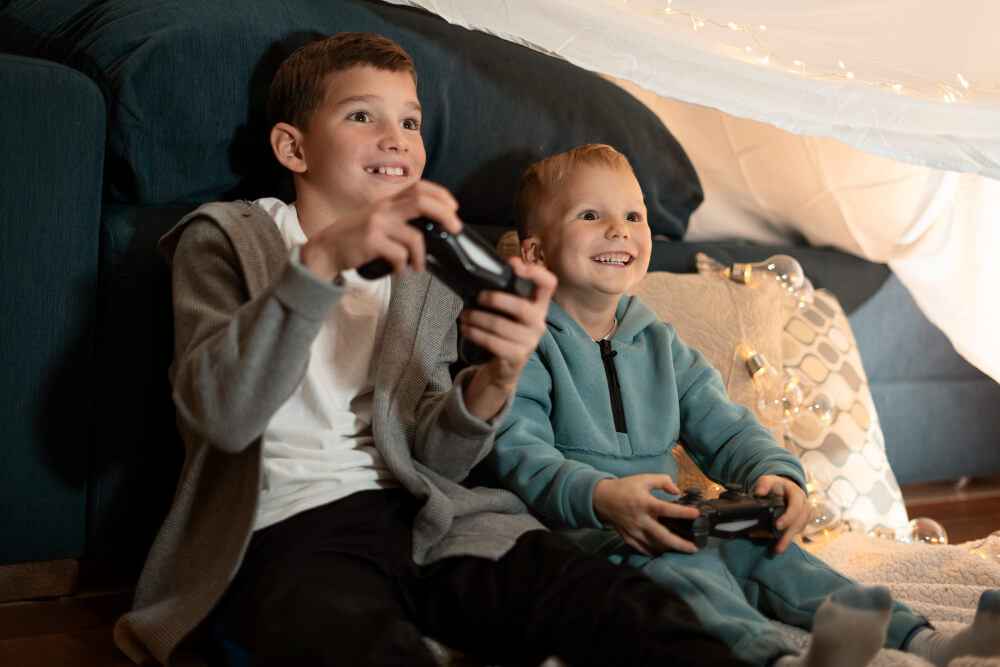In today’s digital world, kids video games are everywhere, capturing the attention of even the youngest kids. From toddlers to teens, video games can keep children busy and engaged for hours. But if you’re a parent, you’ve likely wondered: How much screen time is okay? Can video games be good for kids? How do we balance fun and learning in this digital age?
In this guide, we’ll walk you through everything you need to know about kids video games, from choosing the right games to setting screen-time boundaries. We’ll cover essential parent tips, give mom tips for managing those ever-popular screens, and even suggest some activities that balance online gaming with offline fun.
- Understanding the Impact of Video Games on Kids
- Parent Tips: Choosing the Right Video Games for Kids
- Setting Healthy Screen-Time Boundaries
- Educational Video Games That Parents Can Feel Good About
- Mom Tips: How to Stay Involved in Your Kids' Gaming
- The Best Offline Activities for Kids Who Love Video Games
- Encouraging Mindful Gaming: Teaching Kids to Self-Regulate
- Video Games and Physical Health: Finding the Right Balance
- Crafting a Balanced Daily Routine with Video Games
- Involving the Whole Family: Making Gaming a Fun, Shared Activity
- FAQ: Additional Tips for Parents Navigating Kids’ Video Games
- Final Thoughts on Kids Video Games: Building a Balanced Approach
Understanding the Impact of Video Games on Kids
As a parent, you might be cautious about the effects of gaming. It’s totally normal! Let’s explore some of the positive and negative impacts of video games on children to help guide your decisions.
Positive Effects of Kids Video Games
Gaming, when balanced well, can bring some surprising benefits:
- Educational Value: Many games are designed to teach, from basic math games for toddlers to problem-solving and strategy games for older kids.
- Hand-Eye Coordination: Games that require precise movements, such as sports or adventure games, can improve hand-eye coordination.
- Social Skills: Cooperative games allow kids to work with friends, teaching teamwork and communication.
Potential Downsides of Kids Video Games
Not all gaming effects are positive.
- Screen Time Overload: Too much screen time can lead to issues like eye strain and reduced outdoor activity.
- Aggression in Some Games: Violent video games may increase aggression in some children, the effects can vary significantly.
- Addiction Risks: Some games are so engaging that children may find it difficult to step away, which can negatively impact their other activities and routines.
Parent Tips: Choosing the Right Video Games for Kids
Finding the best games for your kids isn’t just about avoiding certain types. It’s about understanding what’s out there and knowing which games match your family’s values.
Look for Age-Appropriate Content
Choose games with content suitable for your child’s age:
- For toddlers, stick to games that are simple and educational. Look for puzzle games, colors, and shapes.
- Young kids (5-8 years old) benefit from games that combine learning with fun. Think games that involve storytelling, basic math, or animal recognition.
- For older kids and tweens, strategy and puzzle games encourage thinking and planning.
Check Game Ratings
The Entertainment Software Rating Board (ESRB) rates games based on content. Common categories are:
- E (Everyone): Suitable for all ages
- E10+ (Everyone 10 and up): Suitable for ages 10+
- T (Teen): Suitable for ages 13+
Therefore, it is essential to ensure you understand the rating before purchasing or downloading a game for your child.

Setting Healthy Screen-Time Boundaries
While setting boundaries on screen time may feel like a constant battle, it is crucial for their health and development
Establish Screen-Free Zones and Times
Creating screen-free zones can encourage balance.
- No Screens at Mealtime: Make family meals a time to connect and talk without screens.
- Bedrooms are Off-Limits: Keeping screens out of bedrooms can help children relax and sleep better.
Use Tech for Time Management
Some consoles and devices allow parents to set screen-time limits. Use these tools to give kids their gaming time while still maintaining balance. Some parents find success by creating a weekly gaming schedule, which can be a simple way to manage expectations and ensure fair playtime.
Encourage a Balance of Online and Offline Play
Balance gaming with offline activities like sports, reading, or crafting. Mix video games with physical playtime to keep kids active.
Educational Video Games That Parents Can Feel Good About
Here are some popular video games with educational value that kids will love and that parents can trust.
Toddlers and Young Kids
- ABCmouse: This early learning app covers reading, math, and art.
- Endless Alphabet: Teaches vocabulary with fun characters.
School-Age Kids
- Minecraft Education Edition: Teaches problem-solving, math, and even coding.
- Prodigy: A math game that makes learning fun and engaging.
Teens and Teens
- Civilization VI: Teaches strategy, history, and critical thinking.
- Scratch: allows kids to learn coding in a game-like environment.

Mom Tips: How to Stay Involved in Your Kids’ Gaming
As moms, staying involved in your child’s gaming world can make a difference. Here’s how to do it without becoming the “game police”:
Play Along Sometimes
Consider playing video games with your kids occasionally. Not only does it give you insight into the games they enjoy, but it also helps you bond and lets them see you’re interested in their hobbies.
Ask Questions About the Games They Play
By asking about their favorite games, you can not only stay informed but also foster open communication. Ask about the characters, storylines, or even specific goals in the game. This can make your child feel understood and keep you in the loop about their gaming world.
Reward Breaks from Screen Time
Encourage other activities by rewarding screen breaks. This might be with a new book, craft project, or special outing. Make sure to communicate that, although gaming is fun, other activities can also be equally enjoyable.
The Best Offline Activities for Kids Who Love Video Games
To balance screen time with fun offline activities, consider some of these engaging ideas:
- Creative Storytelling: Challenge kids to write or draw their own game-like stories.
- Puzzle Building: Puzzles enhance problem-solving skills, a vital skill in many games.
- Outdoor Obstacle Courses: Set up a backyard obstacle course.
Encouraging Mindful Gaming: Teaching Kids to Self-Regulate
One of the best skills we can teach our kids is mindful gaming—an awareness of when to start, pause, and stop gaming. Teaching kids self-regulation empowers them to enjoy video games without letting them take control. Here are some tips for encouraging mindful gaming:
Set Clear Expectations
Kids thrive when they understand boundaries, and gaming is no different. Clearly communicate how much time they’re allowed to play and the consequences for overstepping those limits. Avoid framing it as a punishment. Instead, present it as a way to enjoy games without losing out on other activities.
Establish “Pause and Reflect” Moments
Additionally, introduce brief pauses during gameplay, allowing them to reflect on what they’ve accomplished so far and consider how much more time they should spend. It’s a simple step to help kids develop self-awareness and decision-making.
Model Balanced Behavior
Since kids often mimic our actions, it’s important to demonstrate balanced screen habits yourself. Whether you’re using your phone, TV, or tablet, showing that you also recognize when to put screens down reinforces healthy habits.

Video Games and Physical Health: Finding the Right Balance
Physical health can sometimes be overlooked when kids get lost in their digital worlds, but keeping active is essential for growth and overall well-being. Here’s how to balance the physical and digital:
Encourage Active Video Games
Active video games like Just Dance or Ring Fit Adventure blend physical movement with gaming fun, providing a way for kids to get their energy out while still enjoying screen time.
Implement Regular Breaks
Remind kids to take a break every 30–45 minutes to stretch, move around, and rest their eyes. These breaks can make a huge difference, especially for their eye health and posture.
Balance Screen Time with Outdoor Play
Kids who enjoy video games might also love similar outdoor games. If your child likes racing games, try go-karting or biking. For fans of adventure games, nature hikes and scavenger hunts are fantastic real-world alternatives.
Crafting a Balanced Daily Routine with Video Games
Creating a daily routine that integrates video games alongside other activities can make gaming time more enjoyable and balanced. Here’s a sample schedule for reference:
Morning: School or learning activities, followed by a physical activity like biking or playing outside.
Early Afternoon: Creative time (crafting, drawing, reading) and a healthy snack.
Evening: Allow 30-60 minutes for video games, followed by a family dinner with screen-free conversations.
Night: A quiet activity before bed, like reading or storytelling, to wind down without screens.
Involving the Whole Family: Making Gaming a Fun, Shared Activity
Video games don’t have to be a solo experience. Involving the whole family can make gaming a positive, social experience that everyone can enjoy.
Host a Family Game Night
Set aside one night a week where everyone plays a game together. Whether it’s a classic console game, a multiplayer game on a tablet, or even a simple online board game, family game night can be a fun way to connect and laugh together.
Try Cooperative Games
Games that require teamwork are excellent for family play. Look for cooperative games like Overcooked or Mario Party, where you can work together and cheer each other on.
Celebrate Their Gaming Achievements
Recognize and celebrate milestones in your kids’ games, just like you would with a school achievement or sports victory. Praising their progress can make them feel accomplished and seen in their gaming journey.
FAQ: Additional Tips for Parents Navigating Kids’ Video Games
Q: How can I prevent my child from spending too much money on in-game purchases?
A: Set parental controls on purchases and discuss budgeting with your child. Explain that purchases should be thoughtful and not made impulsively.
Q: What should I do if my child gets upset when it’s time to stop playing?
A: Try a countdown method. Give a 10-minute, 5-minute, and final 2-minute warning before it’s time to stop. This helps kids mentally prepare for the end of gaming time.
Q: Can video games help my shy child improve social skills?
Yes, certain cooperative and team-based games can boost communication and collaboration, helping kids practice social skills in a low-pressure environment.
Q: What is a good amount of time for kids to spend on video games?
Experts recommend about one hour a day for younger children. For teens, you might increase it slightly, but always watch for signs of addiction or screen fatigue.
Q: Are there games that are better for toddlers?
A: Yes! Look for games that teach colors, shapes, and basic skills. Simple games like ABCmouse and Endless Alphabet work well for toddlers.
Q: Can video games improve my child’s skills?
A: Absolutely. On one hand, strategy games teach problem-solving skills; on the other hand, interactive games enhance hand-eye coordination and fine motor skills.
Final Thoughts on Kids Video Games: Building a Balanced Approach
When it comes to children’s video games, the key is to find a balance and remain involved. First, choose age-appropriate games that align with your family’s values. Next, set clear limits on screen time and explore games that provide both enjoyment and educational value. Additionally, remember to incorporate plenty of offline activities. Finally, stay connected to your child’s gaming experience by asking questions and occasionally joining in on the fun.
Video games can be a fantastic tool for learning, creativity, and relaxation—when balanced well. By setting clear expectations, staying involved, and teaching kids about responsible gaming habits, parents can guide their children in a way that keeps gaming fun, safe, and beneficial.
By following these tips and keeping an open mind, video games can be a part of your child’s life without taking over. Enjoy gaming and explore all the ways you can make it a positive, enriching experience for your family!

